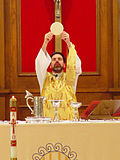- Dominus vobiscum
-
 Solemn chant tones of the Dominus vobiscum, from the Liber Usualis. A bishop says "Pax vobis" ("Peace to you") instead. Accent marks are supplied to indicate the stress.
Solemn chant tones of the Dominus vobiscum, from the Liber Usualis. A bishop says "Pax vobis" ("Peace to you") instead. Accent marks are supplied to indicate the stress.
Dominus vobiscum, a Latin phrase meaning "The Lord be with you", is an ancient salutation and blessing traditionally used by the clergy in the Roman Catholic Mass, as well as in the liturgies of other Western Christian denominations.
Usage
The response is Et cum spiritu tuo, meaning "And with your spirit." Some English translations, such as the Anglican Book of Common Prayer, translate the response in the older form, "And with thy spirit". The ICEL translation presently in use for Roman Catholic Masses in English has, "The Lord be with you / And also with you." In 2001, however, the Holy See issued the instruction Liturgiam Authenticam concerning the use of vernacular languages in the Mass; the instruction requires that certain phrases, such as the response Et cum spiritu tuo, which "belong to the heritage of the whole or of a great part of the ancient Church, as well as others that have become part of the general human patrimony, are to be respected by a translation that is as literal as possible . . . ."[1] Accordingly, upcoming revisions to the English version of the Roman Missal will use the response "And with your spirit" to reflect an accurate translation of the Latin.[2]
The exchange is also said before the collect in the Lutheran Divine Service. In some Jewish rites, a person called up to the Torah says Adonai immachem; the sense is identical.[3]
Origins
The salutation is taken from the verses Ruth 2:4 and 2 Chronicles 15:2 in the Vulgate, the Latin translation of the Bible. In Ruth, the phrase appears in the sentence, "Et ecce ipse veniebat de Bethlehem dixitque messoribus: 'Dominus vobiscum'. Qui responderunt ei: 'Benedicat tibi Dominus'." ("Boaz himself came from Bethlehem and said to the harvesters, 'The LORD be with you!' and they replied, 'The LORD bless you!'")[4] II Chronicles recounts that Azariah, filled with the spirit of God, said, "Audite me, Asa et omnis Iuda et Beniamin! Dominus vobiscum, quia fuistis cum eo. Si quaesieritis eum, invenietur a vobis; si autem dereliqueritis eum, derelinquet vos." ("Hear me, Asa and all Judah and Benjamin! The LORD is with you when you are with him, and if you seek him he will be present to you; but if you abandon him, he will abandon you.")[5]
The phrase additionally appears in Numbers 14:42: "Nolite ascendere: non enim est Dominus vobiscum: ne corruatis coram inimicis vestris."[6] (Hebrew Ayn adonai b'qirb'chem) The expression in Hebrew means to be successful.[citation needed] It also occurs in 1 Samuel 17:37 where Saul tells David "Go and may the Lord be with you" (Lech va'adonai y'hiyeh im'cha).
References
- ^ Liturgiam Authenticam (English tr.) ¶ 56.
- ^ United States Conference of Catholic Bishops, Sample Text: Changes in the People's Parts.
- ^ Book of Prayer of the Spanish and Portuguese Jews' Congregation, London vol. 1, page 47.
- ^ The Latin here is taken from the Nova Vulgata (source), and the English from the New American Bible (source).
- ^ Source: Latin, English.
- ^ The New American Bible translates the verse, "Do not go up, because the LORD is not in your midst; if you go, you will be beaten down before your enemies." (Source.)
Order of the Divine Service in Lutheranism Preparatory Service Entrance hymn and Trinitarian formula (known as the Invocation) · Penitential Rite including the Confiteor and Declaration of Grace (or Asperges on Easter)
The Service of the Word Introit · Gloria Patri · Kýrie · Gloria · Dominus Vobiscum · Oremus · Collect · Old Testament reading · gradual (or Responsorial Psalm) · Epistle · Alleluia (tract during Lent) · Gospel · Hymn of the day · Homily or Postil (Sermon) · Nicene Creed (Athanasian Creed on Trinity Sunday) · Offertory · Prayers of the FaithfulThe Service of the Eucharist Preface (Sursum corda / Sanctus / Hosanna) · Eucharistic Prayer (Epiclesis / Words of Institution / Memorial Acclamation) · Lord's Prayer · Sign of peace / pax (elevation) · Agnus Dei · Distribution · Nunc dimittis · Postcommunion · Benedicamus Domino · Benediction · Dismissal · Ite missa estParticipants Parts of the Sanctuary altar · altar bell · altar crucifix · altar rails · kneeler · piscina · processional cross · tabernacleCandles Liturgical vessels Liturgical objects collection basket · holy water · incense (use) · paten · sacramental bread (wafer) · sacramental wine · thuribleVestments Liturgical books and hymnals Agenda · Evangelical Lutheran Hymn-Book · Evangelical Lutheran Worship · Lutheran Book of Worship · Lutheran Hymnal · Lutheran Hymnal with Supplement · Lutheran Service Book · Lutheran Worship · Service Book and Hymnal Lutheranism PortalCategories:
Lutheranism PortalCategories:- Roman Catholic Church in Canada
- Buildings and structures in Quebec
- Structure of the Mass
- Lutheran liturgy and worship
Wikimedia Foundation. 2010.
